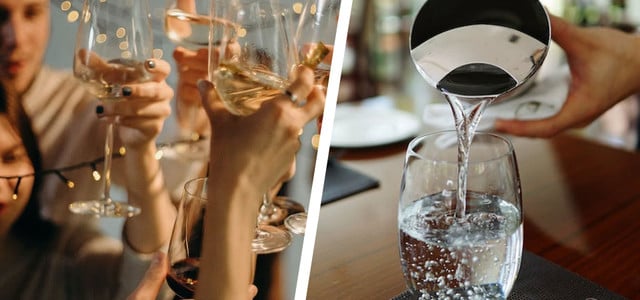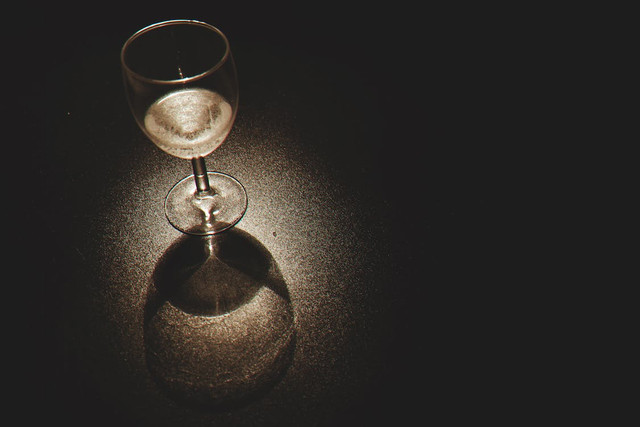
An after-work beer here, a glass of champagne for a toast there: alcohol has a permanent place in our society – although it is by no means healthy. Utopia shows what health risks alcohol consumption brings with it and how you can manage to drink less alcohol.
It’s one of the most popular resolutions every year: drink less alcohol. Many people consciously go on a radical withdrawal for a month, but by Carnival at the latest, many people look too deeply into the glass. We have tried and tested tips on how you can drink less alcohol all year round.
Drinking alcohol: a toxic part of our society
It’s hard to imagine our everyday life without alcohol: we meet up for a beer at the end of the day, toast our birthdays with champagne and drink a glass of red wine with dinner. For many people, partying and drinking alcohol go hand in hand. Alcohol consumption is correspondingly high in Germany; Per capita, people aged 15 and over in this country drink around ten liters of pure alcohol per year (source: DHS).
The problem: We often associate alcohol with socializing, perceive consumption as normal – and find it difficult to imagine celebrations without alcohol, for example. But that shouldn’t obscure the fact that alcohol is a drug that can be addictive.
The German Center for Addiction Issues (DHS) states that consuming alcohol is always risky. Even small amounts can impair the ability to concentrate and react. In addition, according to the DHS, alcohol consumption can result in various health problems, for example diseases of the liver, pancreas, heart, central and peripheral nervous system and muscles. Alcohol can also cause cancer.
Experts therefore recommend drinking as little or no alcohol as possible. Specifically, the DHS recommends: “Alcohol should be avoided completely on at least two to three days per week.”
For a long time, the DHS recommended adults not to permanently exceed the following amounts in order not to run the risk of illness:
-
Women: twelve grams of pure alcohol daily
-
Men: 24 grams of pure alcohol daily
To illustrate these amounts of alcohol: There are around ten grams of pure alcohol in 0.1 liters of wine or sparkling wine, 0.2 liters of beer or four centiliters (cl) of schnapps. But the DHS now advises people to reduce alcohol for the sake of their health. According to the new findings, even small amounts promote cancer or cardiovascular diseases.
The best tips for drinking less alcohol
We don’t want to spoil a glass of wine with a good meal or a small beer on vacation. But for the sake of your health, you should limit your alcohol consumption. The following tips will make it work.

Important note: We are targeting adults who occasionally drink alcohol and want to limit their alcohol consumption. If you are worried that you are or will become addicted to alcohol, you should seek professional help from a counseling center. The DHS lists contact points on its website, and aid organizations such as Caritas or the Blue Cross also help. The Federal Center for Health Education (BZgA) also offers an information hotline for addiction prevention on 0221 892031.
1. Get an overview of your own alcohol consumption
First of all, it is important that you know how often and how much alcohol you drink. So write down for a month which days you drink and how many glasses you drink. Important: Also write down why you drank on this occasion. You can write this down in your calendar or make a note in your phone.
After the month you have a good overview of how many days a week you drink alcohol and can reduce the days step by step. If you turn to alcohol to unwind or celebrate success, we’ll give you tips below on how to replace drinks like wine and beer in these situations.
2. Set goals for drinking less
Of course, you can do a “cold start” and completely avoid alcohol for a while. This is particularly popular at the beginning of a new year – keyword Dry January – or during Lent.
Our colleague herself tried not drinking alcohol for a month – she rarely reached her limits, but learned a lot about beer and herself. Feel free to read about her experiences in the article: “Dry January”: A month without beer, wine and Co. in self-experimentation
If you don’t want to radically stop drinking, set yourself other goals. These can be:
- Drink alcohol only once a week.
- Don’t drink alcohol for one week every month.
- Drink alcohol on “only” 100 days out of the 365 days of the year.
A fixed rule can help to sustainably reduce the amount of alcohol you drink. If you only loosely resolve to drink “less”, you cannot measurably check whether you are sticking to it.
3. Avoid alcohol in everyday life
Alcohol is often consumed (in abundance) on birthdays, company celebrations and other occasions, but people also unconsciously drink regularly in everyday life. You can reduce this:
-
Don’t buy alcohol for home. This way you won’t be tempted to pour yourself a glass of wine or open a bottle of beer while sitting on the couch in the evening.
- Keyword beer after work: Many people drink it to relax and unwind after a stressful day. Break this routine and relax in other ways: a walk, a yoga session or a podcast will clear your head.
- Alcohol is somehow part of a beer garden or a bar? Simply order the non-alcoholic version and try out the large selection of non-alcoholic beers (also available in organic quality). Wine and sparkling wine are also available non-alcoholic.
-
Non-alcoholic cocktails can be a varied new experience; you can also mix so-called mocktails yourself.
- If you’re bored with water, throw a slice of lemon into your glass or spice up the fizz with mint leaves. A shot of fruit juice or syrup also tastes delicious, but usually contains a lot of sugar.
- When meeting friends or family, consciously suggest activities in which alcohol does not play a role. For example, go on a long hike, go to an escape room, go on a scavenger hunt or cook together.
If you do want to drink alcohol, know your limits and never quench your thirst with alcohol. Remember to drink water in between on party nights and don’t down cocktails etc. quickly, but rather enjoy them slowly.
4. Celebrate successes and drink less alcohol in the long term
If you’re the only one in your group of friends who doesn’t want to drink alcohol, it’s not easy, especially at the beginning. But try to remain steadfast and don’t let yourself be persuaded to drink. Say clearly, “No, I don’t want to drink alcohol today.” You can learn to say no.
Explain to your friends why you want to reduce your alcohol consumption. Maybe you can get one or two people thinking and you’ll soon have allies in staying alcohol-free.
Very important so that you last a long time: If you have achieved your goal for six months, for example, you should celebrate this success. Treat yourself to a massage, a meal at a nice restaurant or a day off just for you.
You will see that over time it will become easier to drink alcohol less often. Because your new routines, such as an after-work walk or a non-alcoholic beer, become routine. This means that you question them less and instead automatically incorporate them into your everyday life.
Read more on Techzle\.com:
- Detoxify the liver: These remedies cleanse the liver naturally
- Miracle cure Elotrans? Two experts urge caution and consideration
- Self-experiment: Sleep in every day for a month